Beginning on Tuesday morning, the pastor’s training camp began. Our team had been invited by the moderator of the Presbyterian Church of Guatemala (pictured below) to come and share particularly on the person and work of the Holy Spirit.
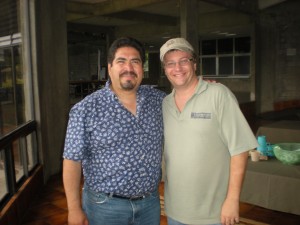 Tuesday
Tuesday
Pastors began to arrive and we gathered for lunch.
We shared the teaching time with another speaker, but various circumstances prevented us from actually networking with him.
Pastors, elders, and seminary students, along with some of the wives gathered at the camp.
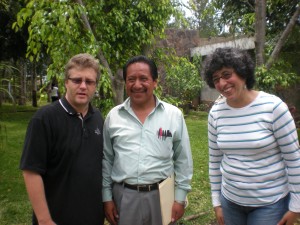
We met Ana (pictured in the blue blouse), who arrived just before our 4.00 session.
Chris began and spoke on the topic of who is the Holy Spirit and the four works of the Spirit as a foundational review.
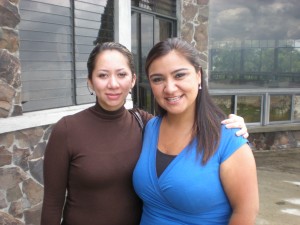
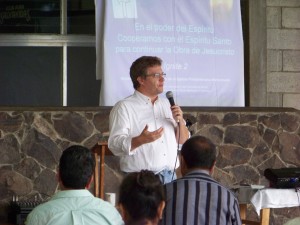
In response to prayer with our intercessors, we were led to specifically talk about how presbyterian we were.
So we included time about my ordination, and some of my journey to faith. We talked about the extremes between ignoring the Holy Spirit, and overempahsizing the Spirit and it’s resultant emotionalism.
We concluded on time. I had them break into 3s for prayer, to leave burdens home and then generally pray for openness to what God wanted to do.
During our team meeting that night (Ana had to go home), we discerned there was some defensiveness in the audience. We knew that we were not going to be on the same tract as the main speaker.
We prayed that God would give us wisdom to think on our feet, that minds would stay open, and we prayed through our teaching plan for the next day.
Wednesday
Sam led off with our foundational teaching on kairos moments – what are they and how do they work.
This moment of cooperation is foundational to understanding how to cooperate with the Holy Spirit and how to experience the working of the Spiritual Gifts.
This was good basic reformed theology, though we could tell that the idea of cooperating with God in working in the kingdom still stirred up some defensiveness.
Do we have the privilege of cooperating with God? Aren’t our works already an expression of what God is doing?
For some, this teaching presented theological challenges.
We took a break and then Chris moved into the function/vocational gifts teaching.
Again, we stressed how Presbyterian we were and helped connect examples of how these gifts might often be used already by our audience. Some were skeptical, but polite.
As a group, they didn’t talk much. They weren’t responsive with Q&A or when we asked them questions. We were not sure how to read or interpret that. Later we figured out that people would corner us 1-1 to ask their questions in private. We saw a lot of spiritual thirst for this information.
The idea of cooperating with the Holy Spirit was a stretch for some of them, and there remained some confusion of the Spirit within/upon distinction that is foundational to the entire Dunamis series. The questions that were asked turned out to be along those lines.
Wedneday afternoon – powerful prayer ministry.
The other speaker used 30 minutes of our time, so we lost some time to teach.
Sam continued to talked about the manifestational gifts and being filled with the Holy Spirit, then we moved into a time of prayer. It appeared that those who were not open to the idea of the ongoing gifts left the room. Those who couldn’t accept the reality of what we were teaching politely left and went outside. That helped narrow down the group to those who were really hungering and thirsting for the work of the Spirit.
People were encouraged to break into groups, pray for each other, and then we broke up into teams for people who wanted prayer for the filling of the Spirit.
Sam and I were a team, Ana and Ben served as a team.
For some, this was a powerful ministry time.
- At least two physical healings were given testimony with evidence continuing the next day.
- One rested in the spirit (who had only been a new convert for 6 months). We talked with her later and she described her experience as falling into a deep sleep and loosing all awareness.
- Others sought out prayer for emotional healing, which we had to postpone until later in the evening.
Unfortunately the prayer time was cut off by announcements and dinner break. There was no time to debrief, and some who wanted prayer didn’t get it.
I wish I could share all that God did that afternoon, but those are just samples. As people talked with us over the next 24 hours, this seemed to be a turning point in the conference.
Our ministry style is not noisy or flashy, nor full of excess emotionalism.
We were simply Presbyterian pastors who are willing to take the risk to cooperate with the Holy Spirit in kingdom work.
We tried to keep our teaching as “down to earth” as possible, as well as our personalities and behavior — being ourselves; we were not some North American superstars with TV ministries that need money.
Dinner and Evening Ministry
Over dinner, I had a brief talk with Yenner, about the spiritual history of the Presbyterian Church of Guatemala and the presbytery.
The presbytery at one point had split because of the charismata, and churches were loosing converts to the pentecostal / neo-pentecostal groups. Outsiders were labeling the Presbyterian Church “dead” because many are missing the “avivimiento” (maybe a liveliness or spirit-filled expressiveness). New converts would leave after discovering that other churches had more passion in their worship services.
After dinner, I took the last plenary session of Wednesday night. The final plenary of the day. Physical exhaustion was clear. People were tired of information.
I used some of the time to clearly debrief the experiences before dinner and walk through the 4 tests of discernment that PRMI uses.
I felt led at the moment to describe how I became a Presbyterian pastor, and how I came under the authority of the word of God.
A lady who experienced a physical healing offered to let us use her as a case study and the 4 discernment tests. This modeled how we could follow the tests of discernment, and keep the prayer times non-emotional.
I’m not sure how well the last teaching connected with people, they were just soooo tired.
It focused on How Does the Holy Spirit talk to us? We looked at examples from Scriptures as we explored some of the mechanics of HOW we might hear God’s voice.
We had another time of prayer ministry and got to do some 1-1 prayer ministry out of that.
In the case with Sam and I, we dealt with two men for some inner healing and some deep issues of forgiveness. Some good emotional healing. I simply served as as translator. Sam threw me for a loop with some word choices I couldn’t translate, and I simply tried my best to explain it rather than translate it.
Ben and Ana did some prayer counseling for a young woman who received some emotional, but incomplete, healing. The evidence was very clear the next day as we checked in with people.
Thursday, our last day.
We were scheduled to have about 1 hour of time, but the other expositor used not only his time, but all of ours .
So we didn’t have a chance to wrap anything up or debrief.
The camp schedule had some tourism time built into it before lunch, so we went to the shore of lake Amatitlan. Unfortunately, the lake is polluted and nutrient imbalanced, so algae slime was really thick. What was a pristine lake a few decades ago has now been ruined. Efforts are underway to restore it, but it will take a few decades for sure.
We used the time to speak with a few of the conference participants about what the event meant for them.
One man in particiular gave us some of Guatemala history, particularly about it’s relationship with neighboring Belize, which he said a former president sold to the UK. In ’74, Guatemala raised an army to invade Belize in an attempt to recapture it as Guatemalan territory, but a major earthquake destroyed Guatemala City and all efforts moved to relief rather than invasion.
After lunch, we traded some goodbyes and had some processing time as a team. Praying about next steps and what should follow.
Finally, we went home on Friday on safe and uneventful flights.
See also:
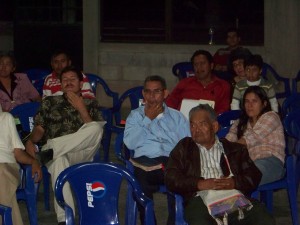
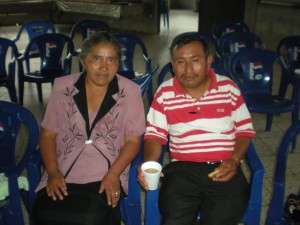
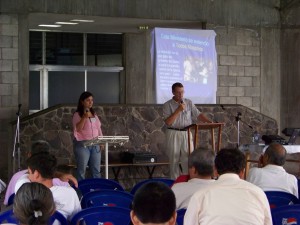
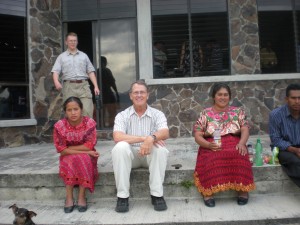
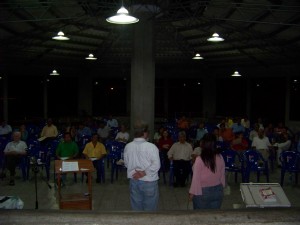
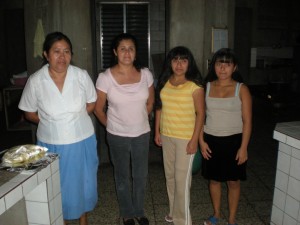
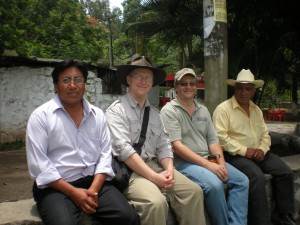
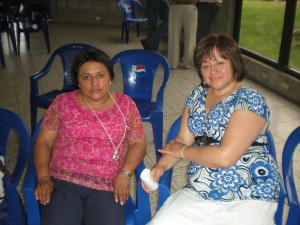
Leave a Reply